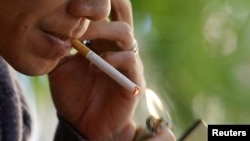GENEVA, SWITZERLAND —
The World Health Organization opened for signature Thursday the Protocol to Eliminate Illicit Trade in Tobacco Products. The protocol, which was adopted by the parties to the WHO Framework Convention on Tobacco Control in November, aims to reduce tobacco consumption by cracking down on the smuggling of cigarettes.
The Protocol to Eliminate Illicit Trade in Tobacco Products was adopted at last November's World Health Organization Conference in Seoul, Korea, after four years of intense negotiations.
Participating ministers and representatives attended a signing ceremony at WHO headquarters to mark the landmark achievement.
WHO Director-General, Margaret Chan pushed hard for the adoption of the Protocol in Seoul. She told delegates attending the ceremony that one of the most joyous moments of her life was its unanimous adoption, despite efforts by the tobacco industry to prevent it from passing.
"The protocol gives the world a unique legal instrument for countering and eventually eliminating a very sophisticated international criminal activity that costs a lot," said Chan. "It costs a lot for the health of the people in your countries. The protocol sets out rules for tackling all forms of illicit trade, including smuggling and illegal manufacturing."
Anti-tobacco advocates say they believe the new protocol will help to protect people across the globe from the health risks of tobacco. WHO calls the tobacco epidemic one of the biggest public health threats the world has ever faced.
It notes the worldwide consumption of tobacco is not decreasing and, in fact, is increasing in developing countries. WHO estimates tobacco kills nearly six million people a year. That means approximately one person dies every six seconds due to tobacco and this accounts for one in 10 adult deaths.
Head of the Secretariat of the WHO Framework Convention on Tobacco Control, Haik Nikogosian, said the Protocol obliges states and governments to globally track and trace illegal tobacco products.
"Simply, what is the public health impact of the illicit trade. Of course, illicit trade has a major fiscal impact also for the governments. They are losing revenue," said Nikogosian. "This is also a source of criminal activities. But our interest from the WHO perspective is the public health impact. And the public health impact is that illicit trade is the source of cheap cigarettes and the cheap cigarettes, because they do not pay the taxes, they fuel the consumption."
Representatives of 12 parties, representing all six WHO regions, signed the protocol during the ceremony. After the initial two days in Geneva, the protocol will remain open for signature at the U.N. headquarters in New York until January 9, 2014. It will enter into force 90 days after the 40th Party has ratified it.
The Protocol to Eliminate Illicit Trade in Tobacco Products was adopted at last November's World Health Organization Conference in Seoul, Korea, after four years of intense negotiations.
Participating ministers and representatives attended a signing ceremony at WHO headquarters to mark the landmark achievement.
WHO Director-General, Margaret Chan pushed hard for the adoption of the Protocol in Seoul. She told delegates attending the ceremony that one of the most joyous moments of her life was its unanimous adoption, despite efforts by the tobacco industry to prevent it from passing.
"The protocol gives the world a unique legal instrument for countering and eventually eliminating a very sophisticated international criminal activity that costs a lot," said Chan. "It costs a lot for the health of the people in your countries. The protocol sets out rules for tackling all forms of illicit trade, including smuggling and illegal manufacturing."
Anti-tobacco advocates say they believe the new protocol will help to protect people across the globe from the health risks of tobacco. WHO calls the tobacco epidemic one of the biggest public health threats the world has ever faced.
It notes the worldwide consumption of tobacco is not decreasing and, in fact, is increasing in developing countries. WHO estimates tobacco kills nearly six million people a year. That means approximately one person dies every six seconds due to tobacco and this accounts for one in 10 adult deaths.
Head of the Secretariat of the WHO Framework Convention on Tobacco Control, Haik Nikogosian, said the Protocol obliges states and governments to globally track and trace illegal tobacco products.
"Simply, what is the public health impact of the illicit trade. Of course, illicit trade has a major fiscal impact also for the governments. They are losing revenue," said Nikogosian. "This is also a source of criminal activities. But our interest from the WHO perspective is the public health impact. And the public health impact is that illicit trade is the source of cheap cigarettes and the cheap cigarettes, because they do not pay the taxes, they fuel the consumption."
Representatives of 12 parties, representing all six WHO regions, signed the protocol during the ceremony. After the initial two days in Geneva, the protocol will remain open for signature at the U.N. headquarters in New York until January 9, 2014. It will enter into force 90 days after the 40th Party has ratified it.




